About one-third of the way into Three Summers (Ben Elton, 2017), there’s a sex scene. It involves a theremin, a fiddle, a crowd of bemused onlookers and, at least in literal terms, no actual sex. The encounter primarily involves Keevey (Rebecca Breeds) and Roland (Robert Sheehan), two very different musicians who – in the classic way of a romantic comedy – have been fighting their attraction to each other. Keevey is wearing step-dancing shoes and tapping out a beat as she plays traditional folk music on the violin. Most of her life has been spent on the road accompanying her father’s Irish band. Roland, conversely, is as pretentious as a musician can get. He has classical musical training in more conventional instruments but has instead opted to focus all his energy on the theremin – a surprisingly complex electronic instrument that you play by waving your arms around metal rods.
Three Summers, as its title suggests, takes place over three summers spent at The Westifal – an intimate folk-music event, inspired by the real-life Fairbridge Festival,[1]Transmission Films, Three Summers press kit, 2017, p. 2. that enables the intersection of people who might otherwise not cross paths. While Keevey and Roland’s love story provides the backbone for the film, it’s certainly not the driving force. The film boasts an impressive cast, including Magda Szubanski, Michael Caton and Deborah Mailman, and includes distinctly Australian cameos by Christiaan Van Vuuren and Nick Boshier in roles that are subtle nods to their comic alter egos, the Bondi Hipsters. This is an ensemble effort, with a remarkable number of different stories and characters weaving and bobbing around one another, immersing audiences, for at least a short time, in a thriving community.
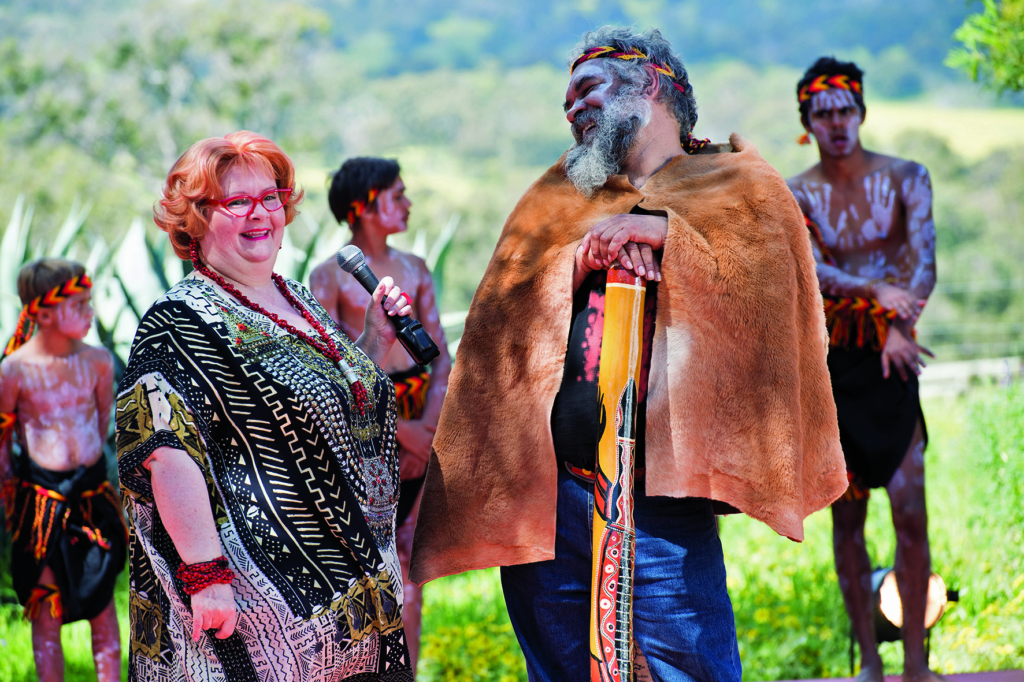
There’s always going to be a trade-off when it comes to choosing between either telling one or two stories with depth, or covering more ground thematically by jumping between lots of different characters. By opting for the latter and framing his film as a comedy, writer/director Elton has firmly placed Three Summers into the ‘light entertainment’ camp – though to dismiss it as superficial would be a mistake. This is a film of mirrors, of reflections, every step of the way – in plot, in production and in philosophy. By navigating so many characters, Elton is able to explore both contemporary and longstanding Australian issues, including racism, family dysfunction, and our treatment of refugees and First Nations peoples. His commentary never feels heavy-handed, however – these issues are an undercurrent driving the plot and quietly influencing all scenes, whether they be whimsical or more overtly serious.
When asked if comedy, for him, is a tool for making audiences more willing to engage with heavy messages, Elton – who, in addition to being a screenwriter and director, is a successful novelist and comedian – stands firm on his intentions. He tells me he isn’t here to preach, but explains that the things that play on a person’s mind are going to come through in their work, whether they want them to or not. ‘I must stress that I would never ask an audience to come to my work with the intention of them hearing my message,’ he says. ‘I use the things I feel and the things I’m thinking about to empower my writing.’ He continues:
Clearly, I am a socially aware writer; it would be stupid to deny that. Most of my work has issues in it, but that’s only because issues are our lives. There isn’t a separation between our environment and our politics, and our existence as citizens and humans and private individuals.
Most of my work has issues in it, but that’s only because issues are our lives. There isn’t a separation between our environment and our politics, and our existence as citizens and humans and private individuals.’
—BEN ELTON
Making a film, much like attending a music festival, necessarily creates a community – a coming-together of people who share a common purpose – even if it may be a fleeting one. A central theme in Three Summers, both on the screen and off, is that of shifting focus from the individual to the group. This is reflected in the ensemble nature of the film as well as in the experiences of its central couple.
As a character, Roland has distanced himself from every form of connection he’s ever had: he’s an Irishman in Australia, he has given up performing in an ensemble and he plays an obscure instrument that he quite literally has no physical contact with. Almost every aspect of him rails against what a folk-music festival is all about – yet he is still there. Keevey, in contrast, is practically the poster girl for The Westifal – playing traditional folk alongside her father’s band, she is extremely comfortable living on the road and beloved by those in the community. We see her arrive and immediately make a barren room look like home: flinging scarves over lamps, and personalising a sterile space in such a well-practised way that it’s clear she’s been doing this for years. However, it gradually becomes apparent that this comfort is a disguise: she lacks the confidence to break out of her folk-music comfort zone to chase her real ambition of getting further training in violin.
Roland and Keevey sit at two ends of a spectrum: one is too much of a lone wolf, while the other has been completely consumed by her community. The musical sex scene I recounted earlier – which Elton describes with a laugh as ‘that amazing sex-off’ – is where the two finally break through their social barrier and begin to reach an equilibrium. What happens is this: Roland is teaching a theremin workshop when Keevey arrives, midway through, and interrogates what she sees as his disdain for traditional folk music. It culminates in them playing a duet – theremin and fiddle – and, as the music gets faster and things heat up, eventually they blow a fuse. The music stops, suddenly, and everyone is left gasping and panting.
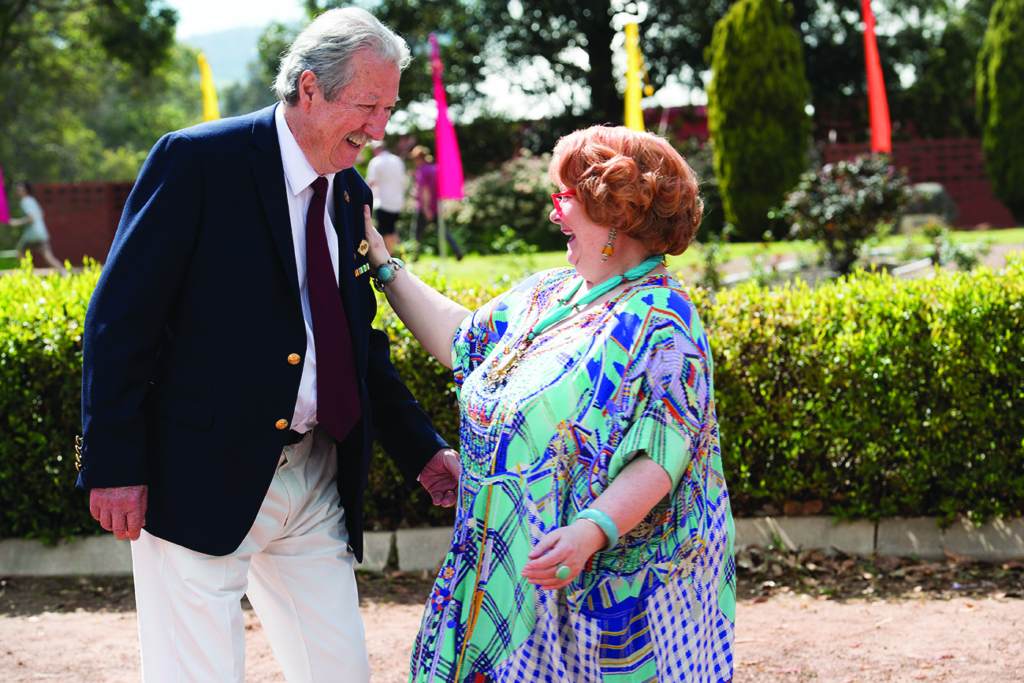
The scene is played for laughs, and it is very funny to watch. For the characters, however, it’s a significant moment in terms of not just their growing attraction, but also how they give each other a glimpse into a different world. Roland realises that he doesn’t have to go it alone, and that perhaps he was wrong to dismiss traditional instruments; Keevey learns that there is a world beyond following her ageing father around the festival circuit.
‘I think individuals thrive in healthy communities,’ Elton says. Despite Three Summers being the second film for which he has served as both writer and director – following Maybe Baby (2000) – he underscores just how much a film is a team effort.
How beautiful does the film look? It looks beautiful. How much of that beauty is mine, and how much of that is Katie Milwright’s, our brilliant cinematographer, and Clayton Jauncey’s, our brilliant [production] designer? I would suggest [that] probably the look and the beauty of the film […] they should have more credit for it than me.
He is full of praise for everyone who played a part in making the film happen – including his wife, Sophie Gare, who helped compose the music for the ‘sex-off’ alongside her brother, Adam, who played both the fiddle and the theremin for that scene as well. He also salutes the actors, particularly Sheehan and Breeds, for their unique ideas and performances.
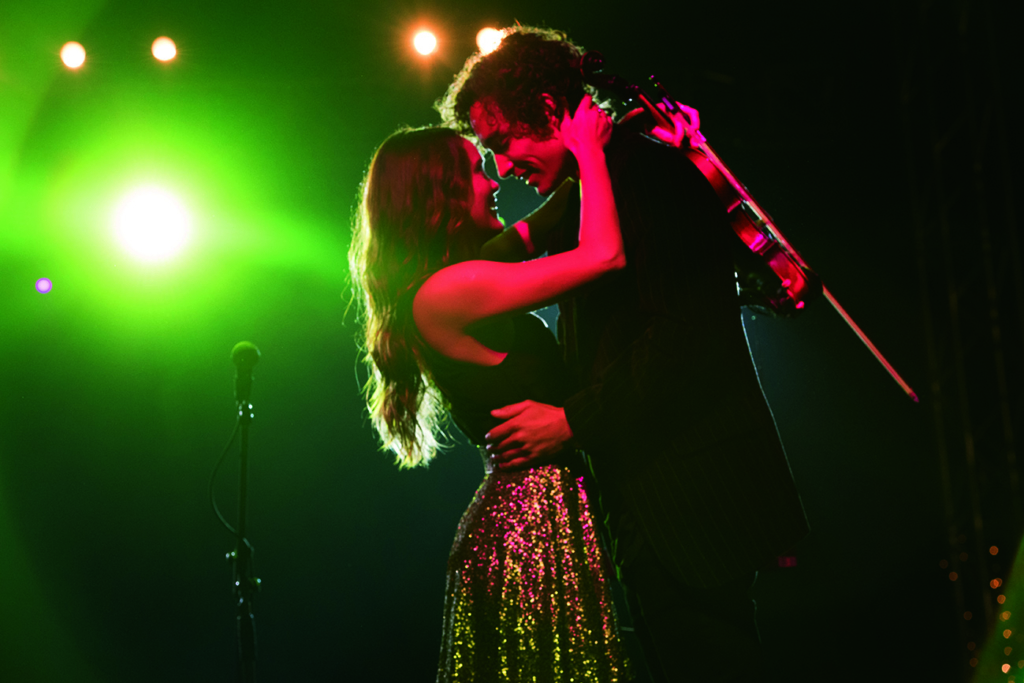
Rob and Rebecca are the most beautiful, funny, touching leads you could possibly dream of, but they’re very generous. They know they’re sharing their movie: it’s an ensemble piece. They share it with the other stories, and that comes across – I think that makes their characters all the more sympathetic.
His enthusiasm and respect for the team he assembled is palpable. Drawing a line that separates the writer and the work he has produced proves impossible, as more of the ideas that pepper the film reveal themselves to be in alignment with Elton’s philosophy on how to make a film. ‘I think that the cult of the director is a bit corrosive, quite frankly; it’s part of the general drift towards the exalting of the individual,’ he explains.
The most humble person on a film set should be the director because every single person is employing their artistry and their energy, normally for very little reward, to enable your vision – and all you’ve got to do is communicate.
The fact that so many people can lay claim to having co-created this film comes across in its various plotlines. We watch as, over three years, characters grow and shift, develop or, in some cases, stay the same. There’s the young blonde girl who just wants to spend time with her work-obsessed, mobile-phone-fixated mother, who returns to the festival the following year as a sulky goth. There’s Caton’s older male character with a big racist chip on his shoulder, who slowly comes around to seeing that his inward gaze and traumatic childhood don’t give him a free pass to discount the experiences of those around him. There’s a truly uncomfortable scene in which a young Indigenous boy is accused of stealing a mobile phone, and social niceties quickly vanish as racist attitudes leap to the surface. Then there’s the heartbreaking musical number by a refugee, given special leave to perform at the festival before being taken back to his camp.
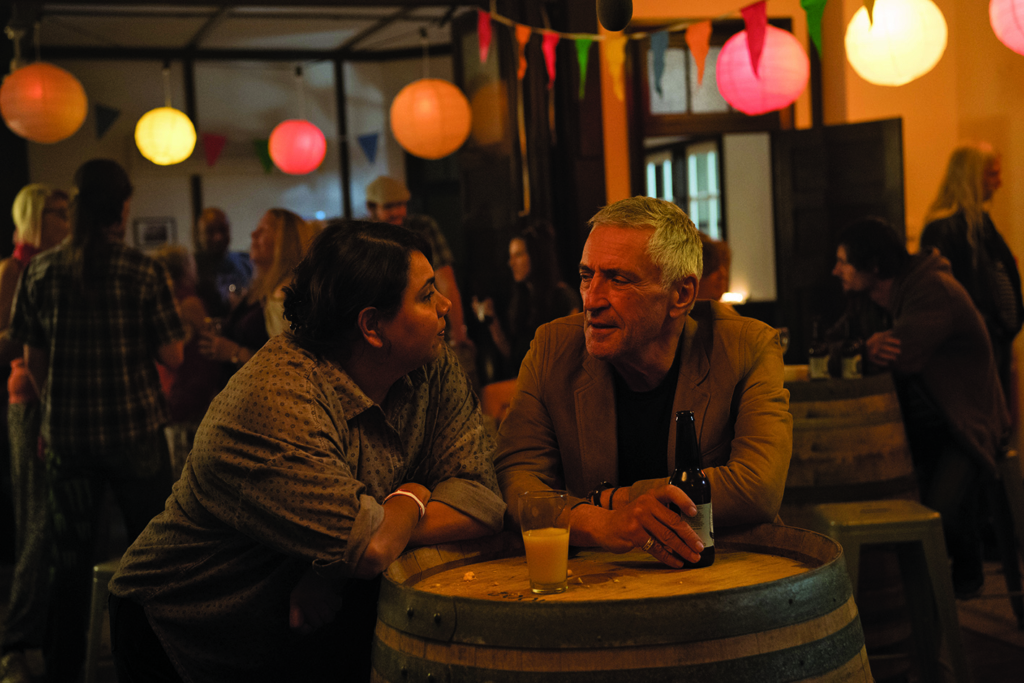
Ultimately, Three Summers is a light comedy with a heavy heart – it can be watched as pure entertainment, but also serves as an interesting snapshot of a moment in Australian history, a microcosm of our attitudes, our relationships and our prejudices.
Discussing both the film and his comedy work more generally, Elton reiterates that he isn’t out to preach: ‘You can only write a story from within, directed by your own moral compass […] I have principles, and I don’t contradict them in my work.’ Moreover, in response to having had his work labelled with ‘that dreadful term “political correctness”’, he asserts:
There’s no such thing as political correctness […] It’s a personal morality. Considering other people’s points of view is not piety – it’s good manners. Trying not to offend unnecessarily isn’t piety – it’s good manners. And it’s also about creating a culture in which you also will not be threatened or offended.
As much as Elton doesn’t set out to preach or spread a message, his experience making Three Summers exemplifies how what happens behind the screen can’t help but influence the final product. Beyond the community he cultivated during its production, the film conveys a distinct sense of right and wrong. And, while everything is by no means neatly tied up and packaged into a utopia by the end of the story’s third year, viewers are given a message of hope regarding where society might head. ‘I’d be delighted if the – I won’t call it a “message of inclusiveness” – […] clear fact that inclusiveness, an ability to get along, is at the heart of all our wellbeing [comes through],’ he says.
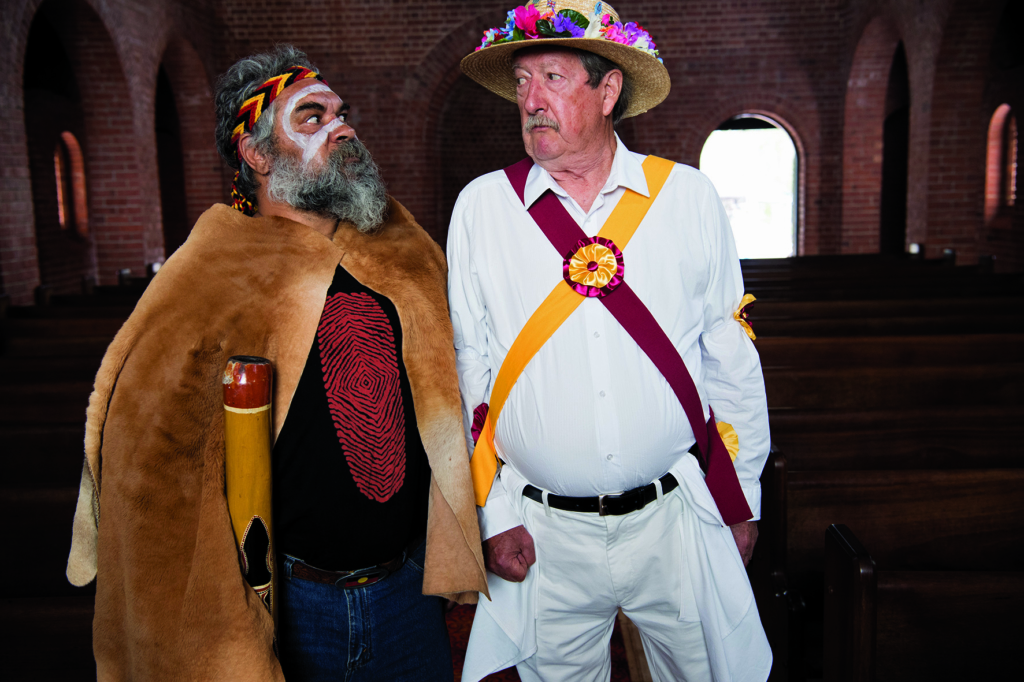
You can’t opt out, you know? If you are racist, you’re going to live in an angry world. So, if we can all try and be a little kinder to each other, and a little more understanding of each other, we’ll all live in a much nicer world and it will be great.
Endnotes
| 1 | Transmission Films, Three Summers press kit, 2017, p. 2. |
|---|





